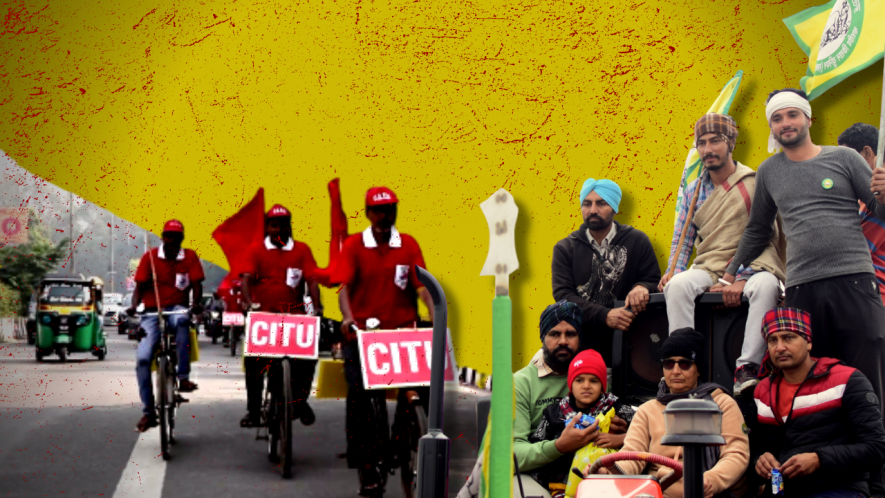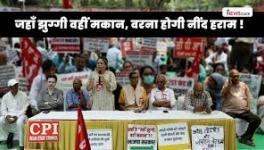2021 -- A Year of Resistance, and Victories

Simmering anger and desperation among the people of the country against worsening economic conditions and the government’s indifference to it, overflowed in the year that’s just ending. Rising prices, raging joblessness, cuts in wages, and insecurity of jobs, were already weighing down a majority of the people, but the government had added to this by pushing harsh measures to increase this burden. These included allowing high prices, including of petrol and diesel, failure to create jobs, huge concessions to corporate houses, new laws (like the now repealed three farm laws, the four labour Codes, the Electricity bill, etc.) that benefited the same corporates, continued sale of public assets and national resources to private hands, invitation to foreign capital to loot various sectors, and so on. All this happened even as a deadly pandemic devastated India over the past two years, but especially in 2021, with 3.3 lakh deaths from COVID taking place this year (in 2020, 1.49 lakh persons died by the disease).
However, as often happens, the people fought back despite the dire conditions – and forced the government back on many issues. One of the biggest victories was that the farmers’ movement, supported by trade unions and other sections of society, forced a stubborn Narendra Modi government to back down and withdraw the farm laws. The struggle lasted one year and over 700 farmers died during it. It spread across the country and saw general strikes, demonstrations at district headquarters, mahapanchayats attended by lakhs, and, of course, the dogged resistance in the form of dharnas at five points of Delhi’s borders with neighbouring states.
The government has also not been able to notify the Rules for the four Labour Codes because many state governments are finding it difficult to accept the framework being imposed by the Central government. The sustained struggle by workers, led by central trade unions, has created the conditions for this impasse. From these big countrywide policy issues to plant level disputes – all have seen increased resistance. That is what the year 2021 would be remembered for.
The past year has also seen increasing solidarity and mutual help between the working class movement and the farmers’ movement. The seeds of this were sown last year but this year the solidarity became deeper, with the Joint Platform of Central Trade Unions consistently supporting the Samyukta Kisan Morcha (a platform of over 500 farmers’ organisations) that was spearheading the farmers’ struggle against the corporatisation of agriculture through the infamous three farm laws.
In this background, industrial workers and service sector employees, including government employees, continued their struggle against the pro-corporate policies of the government.
Some Major Struggles of Workers/Employees
Some of the biggest industrial actions took place among various sectors of the organised sector in 2021. Predominantly, these focused on forcing the government back down on its plans to privatise various public sector enterprises while raising demands for better wages and other local issues. These included:
Defence production employees: After many actions in 2020, defence production employees continued to fight against the government’s moves to corporatise and finally privatise this strategic sector. A joint platform of the defence sector federations decided to go on an indefinite strike against this but, after the INTUC-affiliated federation surrendered and accepted corporatisation, the Modi government imposed the Essential Defence Service Ordinance (late EDS Act) prohibiting strikes in the defence sector and empowering the government to prohibit strikes in sectors having links with defence sector production activities. However, the joint platform has continued its agitations in other forms.
Steel Workers: Workers of public sector steel industry observed a massive strike on June 30, 2021 pressing for their demand for over-delayed wage revision. Besides this, workers of Vizag Steel Plant have been fighting for over 250 days against the government’s move to privatise it.
Coal Workers: Over 40,000 coal workers participated in campaigns and protests against the proposed amendment to the Coal Bearing Land (Acquisition & Development) Act, 1957. This change is meant to facilitate acquisition of coal bearing land for handing over to the private sector.
ASHA & Anganwadi Workers: An all-India strike was called by All India Coordination Committee of ASHA Workers on May 24, 2021 mainly to press for long-standing demands like regularisation, increase in wages, etc. Several all-India protests were also held including on June 10 and July 11. On September 24, at the joint call of various federations, an all-India strike of scheme workers was This was the second – and even bigger – all-India strike during the pandemic. There were also many struggles of anganwadi and mid- day meal workers in several states during this period.
Transport Workers: Lakhs of truck and bus drivers, helpers, mechanics etc. organised a series of protests against changes in the Motor Vehicles Act that favour large monopolies and increase exploitation of these employees.
Central & State Govt. Employees: The employees of both Central and state governments, at the initiative of their respective confederations and federations, have staged number of protest agitations on their demands related to salaries, benefits, against contractualisation and for opening appointments, as also in solidarity with other sections of struggling workers and peasants.
Against Railway Privatisation: Protest demonstrations were held across the country in front of many railway stations on July 16-17, against the government’s move to privatise Indian Railways piece by piece. In several railway stations, large numbers of railway employees, joined the demonstrations.
Construction Workers: After a series of agitations for better working conditions and opposing dilution of construction workers social security scheme through its merger with the new Social Security Code, a countrywide strike was held on December 2-3, 2021.
Electricity Workers: A joint platform of various unions and federations decided to go on a countrywide strike during last session of Parliament against the government’s move to pass the Electricity Amendment Bill 2021. The strike was deferred and kept in abeyance as the Bill was not taken up for enactment.
Bank & Insurance Employees: With the impending further privatisation of financial sector, bank and insurance employees have increased the intensity of their struggle. First, bank employees staged successful strike against privatisation on March 15-16, 2021. However, with the government announcement to privatise certain banks, they again went for a two-day strike on December 16-17.
Meanwhile, general insurance employees observed a successful united strike on March 17, while Life Insurance Corporation employees organised almost total strike on March 18. These massive strikes by financial sector employees evoked widespread public support.
Telecom employees of BSNL: These employees have been valiantly resisting the wilful destruction of public sector BSNL by the government itself in order to favour private telecom giants.
Sales and Medical Representatives: They have been continuously fighting, both at the national level and the company level, against victimisations, wage cut, adverse changes in working conditions and other vindictive measures.
In addition, employees in various private sector industries in Maharashtra, Karnataka, Tamil Nadu, Delhi, Telangana, W.Bengal and other states were also in the thick of struggles on their issues like wage agreements, defending eight-hour working day and also against move of retrenchment and wage cut etc.
More Struggles in New Year
The New Year is destined to be another year of greater struggles. While conditions haven’t changed much, the pandemic appears to be continuing, rejuvenated by the new omicron variant. Some of the key issues that emerged during the past two years relate to the pandemic and will continue to be the focus in coming struggles.
A massive two-day strike has been called by the Joint Platform of Central Trade Unions on February 23-24. Preparations for this are already underway and with farmers’ organisations too extending support, it is bound to be a milestone. Demands include repeal of four labour codes, end to public sector privatisation, increase in minimum wage, social security for all, etc. Included in the demand charter are crucial demands for immediate relief from distress caused by the pandemic. These include Rs.7500 grant to every non-income tax paying family, insurance cover and other protection for frontline workers, accessible vaccination and healthcare for all, etc.
Importantly, trade unions and farmers’ organisations have also decided that they will actively work for the defeat of the ruling Bharatiya Janata Party or BJP in the upcoming Assembly elections in Uttar Pradesh and Uttarakhand. The New Year is surely not going to be easy for Prime Minister Modi and his BJP.
Get the latest reports & analysis with people's perspective on Protests, movements & deep analytical videos, discussions of the current affairs in your Telegram app. Subscribe to NewsClick's Telegram channel & get Real-Time updates on stories, as they get published on our website.
























